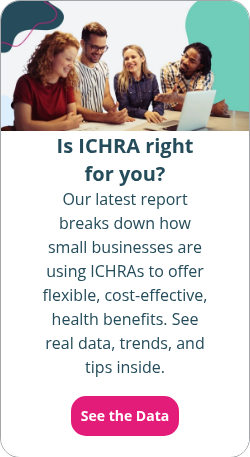What to expect when your employer offers you an ICHRA
By Holly Bengfort on November 2, 2023 at 6:45 AM
If you work for a company that offers employee benefits, you may be familiar with options like group health insurance and retirement plans. However, you may not be as familiar with a newer type of health benefit—the individual coverage health reimbursement arrangement (ICHRA).
The ICHRA can be a valuable benefit for employees, providing them with more flexibility and choice when it comes to their healthcare coverage options. If your employer is offering you an ICHRA, it's important to understand the details and potential implications before you decide to participate.
In this article, we'll explore what the ICHRA is, how it works, and what you can expect if your employer offers you this option.
What is an ICHRA?
An ICHRA is a company-funded health benefit that allows employers to reimburse employees for individual health insurance coverage and other qualifying medical expenses. Unlike traditional group health plans, where the employer selects a specific plan for all employees, an ICHRA gives employees the freedom to choose their own health coverage. They can find the policy that best suits their individual needs.
How does an ICHRA work for employers?
ICHRAs give employers a cost-effective way to control their healthcare spending. Rather than purchasing a one-size-fits-all group plan for their entire workforce, they simply reimburse employees for their individual plan premiums. This helps employers avoid the annual rate hikes that come with traditional group health plans.
Applicable large employers (ALEs) can also use an ICRHA to satisfy the Affordable Care Act's (ACA) employer mandate. This mandate requires organizations with 50 or more full-time equivalent employees (FTEs) to offer affordable health coverage that meets minimum essential coverage (MEC) and minimum value to at least 95% of their full-time employees.
The ICHRA also allows employers to offer different monthly allowance amounts to different employees. This is possible through employee classes.
How does an ICHRA work for employees?
An ICHRA provides employees with more control and flexibility when it comes to their health insurance coverage. When your employer offers you an ICHRA, they'll give you a fixed amount of money to spend on health insurance.
Your allowance amount may vary depending on your age, family size, or employee class like geographic location.
With an ICHRA, you pay for your insurance premiums and medical expenses yourself. Once you make a qualifying purchase, you can request reimbursement for those items or services. Your employer will then reimburse you for your eligible expenses up to your allowance amount. It's important to note that the ICHRA funds your employer provides are non-taxable income.
How do you shop for an individual health insurance policy?
Eligible employees must have individual health insurance coverage to participate in an ICHRA. If you aren't already covered by an individual insurance plan, you'll need to shop for one.
There are several ways employees can shop for an individual health insurance plan. You can do so directly from an insurance company, through a broker, or on the public exchanges. It's important to compare different individual plans and consider factors such as monthly premiums, deductibles, network coverage, and prescription drug coverage to ensure you choose the most suitable option for your needs.
Typically, people can only purchase insurance from the exchanges during open enrollment. However, employees offered an ICHRA by their employer for the first time are eligible for a special enrollment period (SEP). This allows you to enroll in a health insurance plan within 60 days of your employer offering the benefit.
Most states use the federal Health Insurance Marketplace, HealthCare.gov, but some have their own exchanges.
If your employer uses PeopleKeep, you can purchase an individual policy right from your online account. Your employee dashboard will have a link to shop for a policy directly or through your employer’s preferred broker.
What are the reimbursement rules for an ICHRA?
Another key aspect of an ICHRA is the reimbursement process. Once you purchase your ICHRA-qualified plan and opt-in to the benefit, you'll need to submit proof of it to your employer. ICHRA participants must attest that they have qualifying individual health coverage with MEC for every reimbursement request. With PeopleKeep, employees must attest to having coverage each month and for every expense submission. However, you only need to submit proof of insurance once.
Depending on the type of ICHRA your employer offers, your ICHRA allowance covers individual health insurance premiums only or premiums and other medical expenses. Your official notice will explain which plan your employer offers. The IRS outlines qualifying out-of-pocket costs in Publication 502.
To submit a request for reimbursement, you'll need to show proof of your expense. If it's for an individual health plan premium, you'll need to show the insurance carrier, the name of the plan and plan type, the premium amount, and the start and end dates for the plan. For medical expenses, a receipt works just fine as long as it shows the vendor, the price of the product or service, and what the expense was for. In some cases, you'll need a prescription or a doctor's note as well.
Once your employer reviews these documents they will reimburse you for the eligible expenses up to the amount of your ICHRA allowance. If your employer uses PeopleKeep, we review your expenses for them. This ensures HIPAA compliance, as your employer won’t see your specific documentation.
Reimbursements to employees are tax-free. Most employers reimburse their employees through payroll once or twice a month, but you can verify your employer's specific reimbursement schedule directly with them.
It's important to keep in mind that you can't use ICHRA funds for non-healthcare out-of-pocket expenses or premiums for other types of insurance, such as life insurance. Additionally, if your employer uses PeopleKeep, any unused ICHRA funds at the end of the year won’t roll over to the following year. This means you’ll need to use your ICHRA allowance before the end of the plan year, or it will reset.
How do you choose whether to participate in your employer's ICHRA?
There are a lot of factors that go into this decision, so you'll want to take the time to do the math and see which option is best for you.
If you already have insurance you're happy with through another means like a spouse's or parent's group plan, or if you would prefer to go uninsured, then you'll probably want to opt out. That’s because an ICHRA requires an individual health insurance policy.
Short-term plans, healthcare sharing plans or ministries, Medicaid, and COBRA don't count as qualifying individual coverage. If you want to participate in your employer's ICHRA, you’ll need to enroll in a qualifying plan.
If you want to get individual insurance coverage, the main decision you'll have to make is whether to choose your employer's ICHRA or premium tax credits if you're eligible. If you qualify for premium tax credits from the Health Insurance Marketplace, you have to choose them or the ICHRA. You can't use both.
To make this decision, you'll need to know whether the ICHRA your employer is offering you is affordable. For 2026, an ICHRA is “affordable” if an employee isn't expected to pay more than 9.96% of their household income for a self-only silver plan.
You can determine affordability using the following formula:
Household income * .0996 = X
X/12 = Y
Lowest cost silver plan - Y = minimum affordable ICHRA monthly allowance
We also offer an online tool that helps you calculate affordability.
If the ICHRA isn't affordable, then you have two options: participate in the ICHRA anyway or opt out of participating in the ICHRA and use your premium tax credits. In this case, you'll choose whichever option offers you more money. If the premium tax credits you're eligible for are higher than the ICHRA allowance your employer is offering you, then you should opt out of the ICHRA and use the tax credits. If it's the other way around, you should forfeit your tax credits and opt in to the ICHRA instead.
If the ICHRA is affordable, there's really only one option available. ICHRA regulations require you to forfeit your eligibility for premium tax credits if the benefit is affordable. If you opt out of an affordable ICHRA, then you won't be receiving anything from your employer, but you also can't take the premium tax credits, which leaves you with no financial help.
In this situation, you should opt in to the affordable ICHRA so that you'll receive at least some financial help, even if it's less than you could have gotten through premium tax credits.
Conclusion
An ICHRA is an excellent health benefit that's meant to save employers and eligible employees money. If your employer offers you an ICHRA, you can expect greater freedom in selecting your individual health insurance coverage and the ability to tailor it to your unique needs.
Understanding the reimbursement process and the limitations of ICHRA funds will help you make the most of this new employee benefit. However, it's important to carefully review the terms and conditions of your employer's ICHRA offering and seek guidance from insurance professionals if needed.
This blog article was originally published on December 31, 2020. It was last updated on November 2, 2023.
Check out more resources
See these related articles

Reimbursing health insurance premiums? You'll need an HRA
Want to reimburse employees for health insurance premiums? You'll need an HRA. Read how HRAs enable tax-free premium reimbursement while staying compliant.

What is group health insurance?
Curious about group health insurance? This comprehensive guide explains the ins and outs of group coverage and how it works for your organization.

15 individual coverage HRA (ICHRA) FAQs
If you’re new to ICHRAs, don’t worry! This blog answers 15 FAQs employers have about ICHRAs to help you understand how it can benefit your employees.



